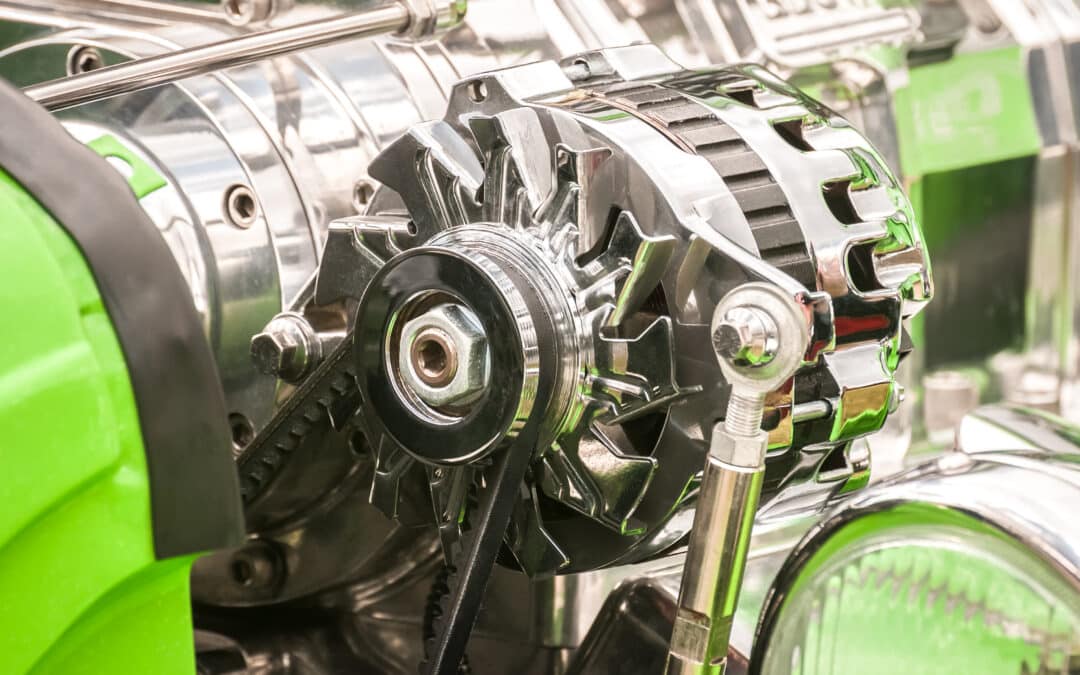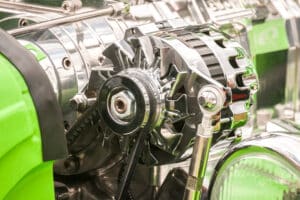Recognize the 7 Signs: Common Alternator Problems Symptoms
When your car starts acting up, the alternator is one of the first things to check. It play a key role of converting mechanical energy into electrical energy, which helps keep your vehicle running.
Without it, your battery would gradually drain, leaving you stranded.
But how do you spot alternator problems symptoms before it’s too late? At Express Auto Irving, we want to help you recognize the signs early, so you can prevent expensive repairs and keep your vehicle running smoothly.
What Does Your Alternator Do Anyway?
Before we jump into the signs of alternator problems symptoms, let’s quickly chat about what this part does. While your battery gets things started, the alternator keeps the electricity flowing while your engine is running. It generates alternating current and then converts it to direct current, which powers everything from your headlights and radio to your windshield wipers and even your car’s computer. Without a healthy alternator, your battery would quickly drain, and you’d be stranded.
Early Warning Signs: Spotting Potential Alternator Issues
Catching alternator problems symptoms early can make a big difference. Here are some of the first signs you might notice:
Dimming or Flickering Lights
One of the most common alternator problems symptoms is dim or flickering headlights, interior lights, or dashboard lights. If you notice your lights aren’t as bright as they used to be, or they seem to pulse or flicker, it could be a sign that your alternator isn’t producing enough voltage. This is a clear indicator that you should get it checked out.
Electrical Issues
Beyond the lights, other electrical components might start acting weird if your alternator is failing. You might experience issues with your power windows moving slowly, your air conditioning not working well, or your radio cutting out. These are all signs that your alternator might not be providing consistent electrical energy.
Warning Light on the Dashboard
Your car is smart, and it often has a built-in warning system. Keep an eye on your dashboard for the battery light or an “ALT” or “GEN” light. While the battery light can sometimes indicate a problem with the battery itself, it often comes on when the alternator isn’t charging properly. Don’t ignore this light!
More Obvious Signs: When Things Start Getting Serious
If you ignore the early warning signs, alternator problems symptoms can become more noticeable and disruptive:
Difficulty Starting or Frequent Jump Starts
A failing alternator can put a lot of strain on your battery. If you need to jump start your car frequently, it could be a sign that your alternator isn’t recharging the battery properly. While a dead battery can cause this, a bad alternator is often the root cause of repeated battery drain. It’s essential to p out how to tell if your battery or alternator is bad to address the real problem.
Unusual Noises
Sometimes, a failing alternator will let you know something is wrong through sound. You might hear a whining, grinding, or rattling noise coming from the engine area. These noises can be due to worn bearings inside the alternator or a loose pulley. Don’t dismiss these sounds; they could indicate an impending alternator failure.
Burning Smell
An unusual burning odor coming from under the hood can be a sign of an overheating alternator or problems with the electrical wiring connected to it. This is a serious sign and must be addressed right away to prevent further damage or even a fire.
Engine Stalling
In some cases, a failing alternator can cause your engine to stall, especially when you’re using a lot of electrical power, like when the air conditioning is on. This is because the engine relies on the alternator for a consistent supply of electricity to keep running.
What Can Cause Alternator Problems?
Think of your alternator as the part that keeps your car’s electricity flowing. Here’s why it might cause alternator problems symptoms:
Old Age
Like anything else, your alternator gets old. The little parts inside, like the bearings that help it spin and the brushes that carry power, just wear out over time. This is a big reason for alternator failure.
Too Hot
Your car’s engine gets super hot. This heat can damage the alternator over time, like leaving your phone in the sun.
Loose Belt
The alternator spins because of a belt. If this belt is loose or damaged, the alternator won’t work right and you’ll see alternator problems symptoms.
Rusty Connections
The wires that connect to your alternator can get rusty, which we call corrosion. This stops the electricity from flowing well.
Too Much Power Needed
If you add a lot of extra stuff to your car that uses electricity, like a super loud radio, it can make the alternator work too hard and wear out faster. This can lead to alternator problems symptoms.
Inside Problems
Inside the alternator, there are tiny parts called diodes and a rectifier that change the type of electricity. If this breaks, the alternator can’t do its job.
Also Read: Will an Alternator Charge a Dead Battery? 7 Myths Debunked!
Taking Care of Your Alternator
While you can’t completely prevent an alternator from eventually wearing out, there are things you can do to potentially extend its lifespan:
Regular Maintenance
Have your car’s charging system checked as part of your regular maintenance schedule.
Check the Belt
Make sure the alternator belt is correctly tensioned and look for signs of wear and tear.
Avoid Overloading
Be mindful of adding too many aftermarket electrical accessories that could strain the alternator.
Keep Connections Clean
Ensure the electrical connections to the alternator are clean and free of corrosion.
Addressing Your Alternator Problems
If you’re experiencing any of these alternator problems symptoms, it’s crucial to get your car checked out by a qualified mechanic as soon as possible. Ignoring these warning signs can result to a complete alternator failure, leaving you stranded and potentially causing further damage to your vehicle.
At Express Auto Irving, we have the expertise to diagnose and fix all sorts of alternator issues. We understand how do you know if your alternator is going bad, and we can accurately determine if the problem lies with your alternator, battery, or something else in your car’s electrical system.
Know More: Expert Advice: How to Test Alternator Output and Ensure Vehicle Reliability in 2025
Frequently Asked Questions
How can you tell if your alternator is going bad?
If your car won’t start, the first question is: how to tell if your battery or alternator is bad? Try these quick tests:
- Jump Start the Car: If the car starts but dies shortly after, it’s likely an alternator issue. If it runs fine after the jump, the battery was likely the problem.
- Check the Battery Voltage: A healthy battery should have around 12.6V when off and 13.7-14.7V when running. If your battery voltage drops below this range, the alternator may not be charging it properly.
Keep in mind that this is a simple test; a professional can do more thorough examinations to determine the actual cause of the problem.
What Happens To Your Car When Your Alternator Goes Bad?
When your alternator completely fails, your car will eventually run solely on the power stored in the battery. Once that electrical energy is depleted, your car will stop running. This can happen suddenly and unexpectedly, which is why it’s so important to address alternator problems symptoms early. You might lose power to essential systems like power steering and brakes, making driving dangerous.
Can You Drive with a Bad Alternator?
While your car might run for a short period on battery power alone, driving with a bad alternator is not recommended. You risk your car stalling unexpectedly, which could lead to accidents. Additionally, you could damage other electrical components in your vehicle. It’s best to get your car to a mechanic as soon as you suspect alternator issues.
How far can a car go with a failing alternator?
A car with a failing alternator can run anywhere from a few minutes to an hour, depending on the battery’s charge. But once the battery is drained, the engine will stall. If you notice alternator problems symptoms, it’s best to get your vehicle checked immediately.
Also Read: How Long Do Alternators Last? 5 Mistakes That Shorten Its Life
How Much Does It Cost to Fix an Alternator?
The cost to fix an alternator can change depending on the make and model of your car, the type of alternator, and the labor costs in your area. Generally, you are likely to pay somewhere between $300 to $800, including parts and labor. Getting a quote from a trusted mechanic like us at Express Auto Irving is always a good idea.
Specific Car Model: What is the symptoms of an alternator problem for 2006 Nissan Altima?
While the general alternator problems symptoms we’ve discussed apply to most vehicles, you might be wondering about specific models. If you drive a 2006 Nissan Altima, you may experience:
- Dimming headlights and dashboard lights
- Whining noises from the alternator pulley
- Frequent battery drain
- Check engine or battery warning light
If you own a Mazda or any other vehicle, the core symptoms remain similar.
Final Thoughts
Recognizing the alternator problems symptoms early is key to preventing breakdowns and ensuring your car’s reliability. Keep an eye out for dimming lights, electrical issues, warning lights, starting problems, unusual noises, and burning smells. If you notice any of these signs, don’t delay in getting your vehicle inspected.
Ready to Get Your Alternator Checked?
If you’re experiencing any of the alternator problems symptoms we’ve discussed, or if you’re unsure about the health of your car’s charging system, the team at Express Auto Irving is here to help. We offer a range of services to keep your car running smoothly, including Alternators, Brakes, Electrical and Check Engine Lights diagnostics, Maintenance, Oil Change, Shocks & Struts, Starters, Suspension, Tire Services, and Wheel Alignment. We proudly serve Irving and the surrounding areas.
Don’t wait until you’re stuck on the side of the road. Give us a call or stop by Express Auto Irving today for a professional inspection. We’ll get to the bottom of any alternator issues and get you back on the road with confidence.
Related Blog
Why an Overcharged Alternator Is Killing Your Car: Top 5 Alternator Overcharging Solutions Revealed
High Output Alternator vs. Standard Alternators: 8 Key Differences You Should Know



Recent Comments